QuestionQUESTION: My friend bought a blue pit bull and is having trouble training it. He is out of town a lot and leaves the puppy at home with his wife and two toddlers. He says the puppy nips at the kids and chases them. He has asked me and my roommate to train to puppy and care for the puppy while he's out of town. We've trained many puppies before and are very satisfied with our own. (We have a rotweiler, a pit, a great dane, a golden retriever, and we're also raising a german shepherd right now) So we've dealt with dominance issues before, but nothing like this. The pit "blue" is 12 weeks old and our german shepherd puppy "kaya" is 13 weeks. The pit will jump on the german shepherd puppy and push her head to the ground and then shake his head with her skin in his mouth and growl. We then pull the pit off of kaya and hold the pit on his side with one hand under his chin to keep him from biting us and the other on his back to keep him from flailing. He will then flail around and make the worst growling noise I've ever heard, it almost sounds like a devilish gargle. He will also thrash his head and chomp his teeth. We hold him still till he gives up (we aren't holding him tight either, just firm) and them let him up. He will also do this when he doesn't want to drop something. He was biting my sweater and he wouldn't let go, and i know you never just pull something out of their mouth, you have to make them drop it. So i would poke my thumb and my index finger on each side of his jaws and squeeze till he let up. Then he would flip out and attack me and I would repeat the holding him on the floor. We've also been trying to pull on his skin and jostle him around like a child would do, but he has no reaction to this. I think its a very bad dominance issue, what do you suggest?
ANSWER: Pits are very intelligent, high energy dogs with a very high threshold for pain. This particular pit is a clown. Everything is a game to him. He thrives on attention so punishment will not work as it's just attention so it'll be more of a reward to him. You can beat this dog with a stick and it won't make a difference. If you do manage to find a punishment that works, you'll just break his trust and he'll lose his sense of humor and his eagerness to please. Alpha rolling him is just a game to him. You alpha roll him and then when he gets up he figures it's his turn. He can't figure out why you can play this game with him and he can't play it with the other pup.
He will learn how to deal with other dogs from other dogs. Unless someone is really getting hurt you shouldn't interfere or he will never learn. He should spend a lot of time very soon with some well-socialized adult dogs who will put him in his place quickly.
He also will need lots of exercise if he is to ever function normally. That's just the sort of dog he is.
As far as training goes, you need to use lots of positive reinforcement and if he is not behaving the way you want him to, you must ignore him completely. If he's just being an absolute nuisance, walk away and put a closed door between you. Don't grab him and take him somewhere, because that's attention and it'll just be another fun game until he gets where he doesn't want to be, and then he'll start associating that game with being where he doesn't want to be and he'll fight you when you initiate it.
Focus on obedience training with him and make sure he learns "drop it" "leave it" and "give it". Incorporate this with something fun, like a retrieving game and teach him self control by making him "wait" when you throw the toy and not letting him go after it until you say "Get it". Then lure him back with a treat and trade the toy for the treat (or another toy) and teach him "give it" or "drop it" that way.
Many dogs who have a hard time focusing on training respond well to a clicker. I would try this with him as I have found many dogs with attention issues find this to be a helpful cue to tell them "now is the time for work". If you make training fun, all the better for a dog of this temperament. A pinch collar won't work because he's got a very high thresh hold for pain and he can out pull you. You cannot give this dog an effective correction, so just don't strain yourself trying.
Maintain pack leadership, and instruct his owners to do so, by following the guidelines at http://www.thegooddogjournal.com/2009/02/whos-boss-establishing-pack-leadership.
Remember the keys with this dog: Any attention is a reward, even negative attention and everything is a game. If you use his learning style to teach him, he'll turn out to be a delightful, fun loving family dog, I am sure. You also want to make sure he gets lots of exercise. Lots of retrieving games (with "wait" "get it" and "give it") and long walks and runs (with "heel" and "wait" at the door). These activities are self-rewarding once the dog gets the hang of them and won't require treats. It sounds like this boy will be happy to get love and maybe some playtime as a reward. He has lots of potential but really needs structure and maybe a job to perform. The secret is to teach him what he should be doing instead of trying to teach him what he shouldn't be doing.
Testing you to see what he can get away with is also fun, so make sure to enforce every command you give but not with punishment. Make him do it through shaping or just stand there and ignore him until he complies; depending on what the situation warrants. He'll figure it out.
---------- FOLLOW-UP ----------
QUESTION: Thank you very much, I just have a few more questions. When the pit is attacking my german shepherd puppy what is the best way to handle the situation? When the pit is being very protective over his bone and food what is the best solution. He's been a lot better with his food we've been making him "sit" and "wait" for his food before he gets it, and we've been handling him and touching the food and his face while he eats and that has gone very well. The only problem is when another dog walks by, he growls and tries to hover over his food to protect it. Also, we have adult dogs, but the puppy won't try to be dominant over them, he's only dominant over our puppy. At first we would let the pit push the german shepherd because she is much bigger and we were hoping that the german shepp would eventually put the pit in his place, but it just turned into an awful dog fight so we had to split it up. We're trying to get the pit ready to go home to two toddlers and apparently at home he terrorizes the children and bites them and their clothes. He wont chase us or bite our clothes, only children's. We try to get down on the ground and act like children but he doesn't catch on. We have taken him next door because they have children, and he attacked them and when we pulled him off he attacked our hands. What would be the best way to handle that situation?
ANSWER: Is he attacking fearfully or aggressively or playfully? I had a pit who used to grab the kids clothes for attention and when she wasn't allowed to play with the kids when she did that, she eventually grew out of it. She even tore my son's (full) diaper off and took off running with it shaking as she went once! It was great fun for her. She was about at that age at the time too. She also would pull the bedding off the bed if she wanted to play and they were sleeping and run off with their toys. All the same. Just don't chase (because that's fun). Ignore. And bring playtime to an abrupt end the minute he gets out of hand.
Unfortunately, dogs view kids differently than adults and you can't trick them into doing anything else. Kids move, smell and act differently, sometimes like pups, sometimes like prey and pits, like all terriers, have a high prey drive. You'll have to watch very carefully to see what is triggering the attacks and deal with the situation. If he's good at first and then starts getting rowdy then you can start with a child standing very still and having him stiff her, clicking and treating and praising him as he does that. Then have the child pet him again clicking and treating and praising as long as he's calm but the minute he gets rowdy remove the child and ignore him for 10 minutes to give him a chance to calm down.
If he's lunging for the child the minute it's spotted, move him back to a place where you can get him to perform some obedience and ignore the child. Have him do some fun obedience- things he knows well and can get treats for- then gradually move closer to the child in increments until you can get to the point described above.
You could take him to a park where children are playing and do this a distance from the kids as well. Just make sure you've got a good hold on him and don't let any kids get too near.
When he's been reasonably desensitized to having kids around, has got some good obedience down and has learned some tricks, especially "down" "bow" "roll over" and "play dead" which put him in a submissive position, you can have a child give the commands and rewards while you hold the leash and enforce the commands and mark with a clicker.
Also make sure the kids all understand pack leadership and dog language. Teach them to watch for signs of aggression and to avoid putting their faces in the dogs' face, or hugging or kissing him. Make sure they know not to let him on the furniture and tell them that if the dog isn't listening to them, they shouldn't keep repeating themselves but instead go get an adult to enforce the desired behavior. Of course, I would never leave a large dog unsupervised with a small child under any circumstances. A toddler can easily get hurt by accident by a large dog.
Do the older dogs ever intervene when things get rough with the pups? Often the dog that is alpha over the others (which is okay as long as they aren't alpha over any people) he will break up any fights that break out. I have seen this happen. The alpha just plows through the two fighters snarling in all directions like a crazy man and then walks away and ignores them both. If your adult dogs aren't stepping up to the plate, I'd just charge at them yelling something random like "Quit being stupid!" so they're startled and stop. Don't punish the offender or pet and coddle the victim because you don't want to punish a dog for playing and you don't want to reward a dog for being a wuss. If you need to put them in separate rooms, do it matter-of-factly.
For the food aggression, start feeding him by hand a few bits at a time. As you are doing this, have someone walk another dog past on a leash, but not too close. Praise him and feed him while he is calm, but if he starts to growl or get stiff or his hackles go up, stop feeding him and ignore him and have the other dog move away again and wait till he's calm before you start feeding him again. Gradually have the decoy dog move closer and closer as long as he's calm.
My mother has three small dogs who used to turn into a mad frenzy every feeding time. We solved their food aggression issues by having myself, my daughter and my sister each stand with a dog on a leash some distance from my mom where they couldn't reach each other but almost could. My mom then said the name of a dog and tossed a treat towards it, then the next dog and so on all around. They went a little crazy at first but eventually they figured out that everyone would get a treat if they waited their turn. This may not work as well with larger dogs who have the ability to pull your arms out of your sockets, but you can try it.
You may find also that as you maintain pack leadership behavior, some of the food aggression will fade with time as well, but don't count on it!
This pup is still a youngster so there is still time for him to turn around! Keep him on his leash at all times so you can get him under control quickly and remember, ignore bad, reward good and give him better options. Having him with your pack is probably the best thing for him I hope it's not too hard on your Shepherd!
---------- FOLLOW-UP ----------
QUESTION: Thank you so much for the advice. My roommate and I think that it is very good advice and will definitely use it. We respect your training methods and would like to ask your advice on some other problems with our other dogs.
Our rottweiler, Kali, is 1yr and 5 months. She is my roommate's dog. She has very good obedience and does anything we ask of her. However, she has a bad growling problem. She growls when she's uncomfortable in any situation. She never attacks or bites unless something provokes her. The only dog she's ever put in place is the pit puppy we just talked about. The puppy pushed her, so she put him in his place. However, if she is eating, she'll growl at any dog that is near her, this is the same for a bone or sometimes toys. Also when I put her on her back she'll growl but not struggle, she won't do this with my roommate (her owner). When I come home, Kali doesn't get up to greet me but she'll be very excited when he owner comes home. My dogs are excited no matter who comes home. I think this may be due to the fact that I don't give her first attention, I give it to my own dogs first and then to her. But I find it weird that she doesn't get up at all. She seems to be a very dominant dog but doesn't act on her dominance unless provoked.
I have a golden retriever and a great dane. The golden retriever, "Jackson," is 1yr and 11 months old, almost two. I just had him fixed a month ago. I was actually hoping to breed him, but I decided to breed my female dane instead, so I had to get him fixed. He obviously still has all of his un-neutered male behaviors. He is very well obedience trained and I've taught him numerous tricks to keep his mind active. However, he doesn't always come back to me when I call him. I feel that this is because of his age and also because of not fixing him until now. What do you think? The main problem I have with him is his insecurity with other un-fixed male dogs. When he was 9 months old he got attacked by a pit bull. Ever since then, he's been nervous around insecure male dogs. Its usually a male dog that isn't fixed. I feel that when Jackson senses that another dog is insecure and unbalanced, Jackson reacts in fear. Ever since his attack, when he is around insecure dogs, he will put his head down and his tail goes up and he growls a very deep, low growl (like from his gut). Is there anyway to make him more comfortable with this? Or what is the best way of handling this?
My other dog, Arizona, is a 10 month old great dane. She has many insecurities. When she is eating her food or chewing on a bone (any possession of an item) and another dog approaches her, she'll hover over her possession and growl in a low tone and turn her head away from the dog. If the other dog doesn't walk away, Arizona will flee the situation. I've tried making her stay, making her give up the bone, but nothing has worked. Also, when I am dealing with the pit bull puppy, Arizona (the great dane) will get very uncomfortable and start whining at me and try to get between me and the pit puppy. Also, whenever I used to leave the house, but my roommate would be there, my great dane would retreat to her crate and stay there until I returned. I bought her a bigger crate because of her size but since it is much bigger she doesn't seem comfortable with it. Now, when I leave, my roommate says that she'll pace back and forth and whenever my roommate opens the door, Arizona will charge out of the door and my roommate will have to stop her. We always have made our dogs wait away from the door before letting them out, but Arizona seems to have gotten more insecure with me gone. Also, Arizona will bark at strangers, mostly males. It used to be much worse. She used to put up her hair and growl and bark loudly without stopping. I worked with her a lot, standing next to her and keeping a leash on her to pop her back every time she barked. Now she will bark at first and usually stop once I correct her. However, with some people, I am unable to stop the barking and growling what is the best way of dealing with this?
I know that's a lot to ask, but I would greatly appreciate the advice. Thanks!
Answer1. Teach the barker to bark and stop on command.
2. Treat all the food aggression issues the same way. Use the trick we used with my mom's dogs to teach your dogs to share.
3. Don't worry too much about the growling. If you correct the dog for growling he will eventually learn not to growl and then you'll never have a warning before a bite. That's no good. Instead address the issues that cause the growling.
4. Don't worry about the favoritism with the dogs. Some dogs prefer some people over others. Just make sure that everyone treats them the same and according to the pack leadership principles in the article I previously referred you to.
5. I think Arizona needs some more socialization with people. Don't punish her when she acts fearful of strangers because that will just confirm to her that the presence of strangers brings about unpleasant things. Instead teach her to sit and offer her paw when she sees someone new. This will give her an appropriate behavior to resort to. Another alternative is to teach her to bring a toy to the new person when they come to the house.

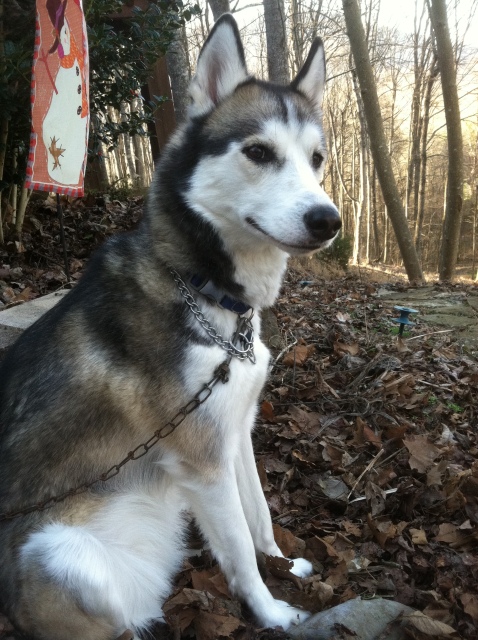 Is putting my dog in a cage a good form of punishment?
Question
Blue
My Siberian husky, Blue, as been b
Is putting my dog in a cage a good form of punishment?
Question
Blue
My Siberian husky, Blue, as been b
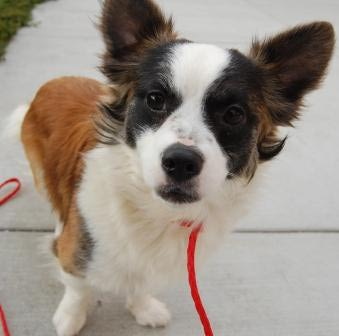 How do you feel about citronella collars?
QuestionPanda
QUESTION: I have a male Corgi mix,
How do you feel about citronella collars?
QuestionPanda
QUESTION: I have a male Corgi mix,
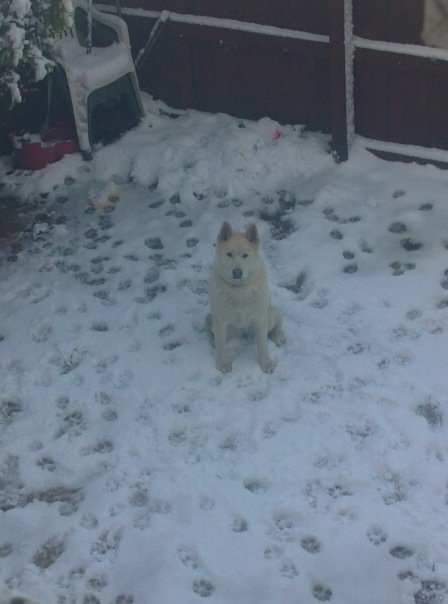 Dog Training And Punishment?
Question
Maya
hi there i have an akita X husky,
Dog Training And Punishment?
Question
Maya
hi there i have an akita X husky,
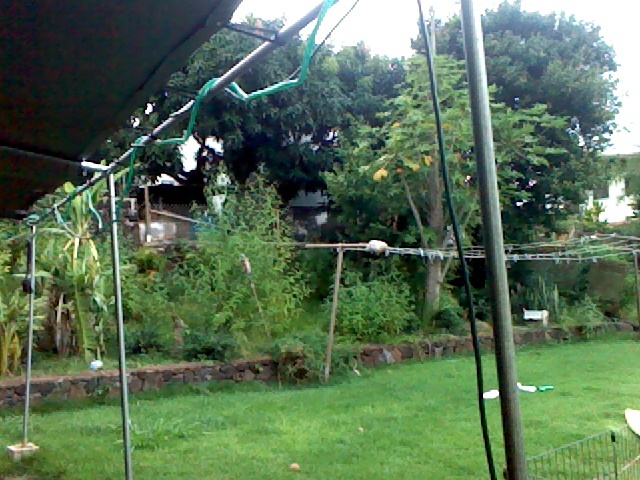 Designating bathroom area
Question
backyard
I have 2 medium mutts that are both b
Designating bathroom area
Question
backyard
I have 2 medium mutts that are both b
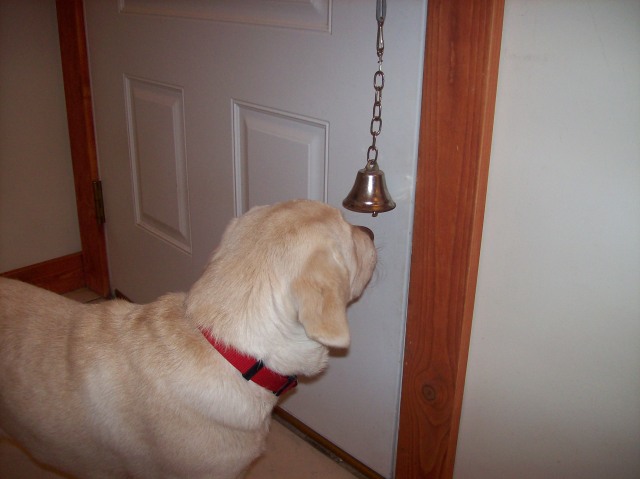 cairn terrier urinating in house
QuestionHi, I have a 2 1/2 year old cairn terrier who w
cairn terrier urinating in house
QuestionHi, I have a 2 1/2 year old cairn terrier who w